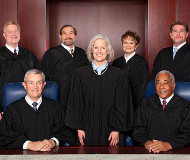4/21/2014
Nevada: Cars Stopped For a Pebble In the WindshieldA pebble in the windshield justifies the search of a car according to a new Nevada Supreme Court ruling.

Nevada's Supreme Court earlier this month decided that motorists can be stopped and searched if a tiny rock scratches a vehicle's windshield. The court took up a case where a police officer stopped a motorist but was wrong about the statute governing windshields. The high court decided to find a way to make the initial stop stick.
The case revolved around whether Deputy Wendy Jason was right to pull over Jarvis Deer Cantsee when she saw he had a crack across his windshield in what she thought was a violation of a statute banning driving "with any sign poster or other nontransparent material upon the front windshield." A lower court ruled that the traffic stop was inappropriate because the deputy got the law wrong, but the state appealed all the way to the high court. A divided majority sided with the prosecution.
"We conclude that a police officer's citation to an incorrect statute is not a mistake of law that invalidates an investigatory traffic stop under the Fourth Amendment if another statute nonetheless prohibits the suspected conduct," Justice James W. Hardesty wrote for the court. "Therefore, we reverse the district court's order."
Justice Michael A. Cherry, in the minority, warned of the consequence of his colleagues' finding.
"Of course, this argument is troubling; its adoption would make any citizen who was the victim of a pebble lodged in a windshield, a frequent occurrence on those long drives across our vast state, susceptible to a traffic stop," the dissenting opinion explained.
In the course of the lower court battle, state prosecutors decided that Cantsee must have violated a different statute, NRS 484B.163, which states: "A vehicle must not be operated upon any highway unless the driver's vision through any required glass equipment is normal." Washoe County Judge David A. Hardy found the switch of statute in the middle of the case unfairly surprised the defense, and he ordered the evidence obtained from the stop suppressed. This is the first time the issue has come before the state Supreme Court.
"There is a difference between a mistake of law and a mistake as to which law applies," Justice Hardesty wrote for the majority. "Deputy Jason initiated the traffic stop because of the cracked windshield. She cited Cantsee for violating NRS 484D.435, believing that it was the applicable statute. She was mistaken. Although this statute does not prohibit Cantsee's conduct, a crack that obstructs the driver's vision through the windshield could be an infraction under NRS 484B.163. We conclude that this statute provides a lawful ground to justify the stop because the crack in the windshield might have obstructed Cantsee's view."
Justice Cherry, in his dissent, points out that the trial judge had already rejected the possibility that there was a violation of the 484B.163 statute. The majority insisted on sending the case back to the lower court for adjudication on this question.
A copy of the ruling is available in a PDF file at the source link below.


